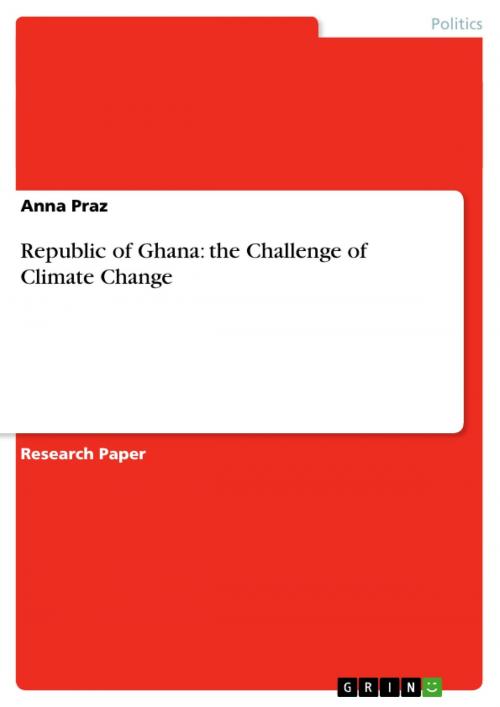Republic of Ghana: the Challenge of Climate Change
Nonfiction, Social & Cultural Studies, Political Science, International, International Relations| Author: | Anna Praz | ISBN: | 9783640740970 |
| Publisher: | GRIN Publishing | Publication: | November 4, 2010 |
| Imprint: | GRIN Publishing | Language: | English |
| Author: | Anna Praz |
| ISBN: | 9783640740970 |
| Publisher: | GRIN Publishing |
| Publication: | November 4, 2010 |
| Imprint: | GRIN Publishing |
| Language: | English |
Research Paper (postgraduate) from the year 2010 in the subject Politics - International Politics - Region: Africa, grade: A, Free University of Berlin, course: Introduction to Africa´s Political and Economic Systems, language: English, abstract: According to Angel Gurrìa, Secretary General of the Organization for Economic Cooperation and Development (OECD), tackling Climate Change can be considered the greatest environmental challenge the world is facing today. 1 Developing countries are particularly vulnerable to the impacts of Climate Change because they heavily rely on climate-sensitive sectors, with a high dependence on natural resources, a high level of poverty, low levels of education and limited human, institutional, economic, technical and financial capacities to cope with them. In particular, Africa is one of the most vulnerable continents to Climate Change and variability. Ghana, is an example of how Climate Change, especially global warming and rain variability, can affect negatively the human and economic development of a country. The impacts are significant, and affect more or less indirectly all the eight Millennium Development Goals: eradicate poverty and hunger (1), promote gender equality (2), improve health and child mortality (4, 5, 6), ensure environmental sustainability (7) and foster global partnership (8). In particular, in Ghana (despite of its relative good position in terms of Human Development Index2 among sub-Saharan African countries), poverty is a predominant multi-dimensional phenomenon. Poverty has a dynamic attribute in the sense that it changes over time across space and individuals, through natural hazards, war and politics. But while the latter are directly man-driven, natural hazards, climate variability and global warming are global effects not easily under man's control. They remain however, at least for the moment, manageable, through adaptation and mitigation strategies. The role of the international community towards these commitments is central. It's clear, that as a broad development challenge, Climate Change mitigation and adaptation need also to be mainstreamed into the national governance organization and processes. The whole research has been conducted on the ground, with the consultation of renowned experts in the field. The fact of working with the German Development Cooperation on this topic has enabled me to have an insight on how bilateral and international cooperation address such an issue in a west African middleincome country.
Research Paper (postgraduate) from the year 2010 in the subject Politics - International Politics - Region: Africa, grade: A, Free University of Berlin, course: Introduction to Africa´s Political and Economic Systems, language: English, abstract: According to Angel Gurrìa, Secretary General of the Organization for Economic Cooperation and Development (OECD), tackling Climate Change can be considered the greatest environmental challenge the world is facing today. 1 Developing countries are particularly vulnerable to the impacts of Climate Change because they heavily rely on climate-sensitive sectors, with a high dependence on natural resources, a high level of poverty, low levels of education and limited human, institutional, economic, technical and financial capacities to cope with them. In particular, Africa is one of the most vulnerable continents to Climate Change and variability. Ghana, is an example of how Climate Change, especially global warming and rain variability, can affect negatively the human and economic development of a country. The impacts are significant, and affect more or less indirectly all the eight Millennium Development Goals: eradicate poverty and hunger (1), promote gender equality (2), improve health and child mortality (4, 5, 6), ensure environmental sustainability (7) and foster global partnership (8). In particular, in Ghana (despite of its relative good position in terms of Human Development Index2 among sub-Saharan African countries), poverty is a predominant multi-dimensional phenomenon. Poverty has a dynamic attribute in the sense that it changes over time across space and individuals, through natural hazards, war and politics. But while the latter are directly man-driven, natural hazards, climate variability and global warming are global effects not easily under man's control. They remain however, at least for the moment, manageable, through adaptation and mitigation strategies. The role of the international community towards these commitments is central. It's clear, that as a broad development challenge, Climate Change mitigation and adaptation need also to be mainstreamed into the national governance organization and processes. The whole research has been conducted on the ground, with the consultation of renowned experts in the field. The fact of working with the German Development Cooperation on this topic has enabled me to have an insight on how bilateral and international cooperation address such an issue in a west African middleincome country.















